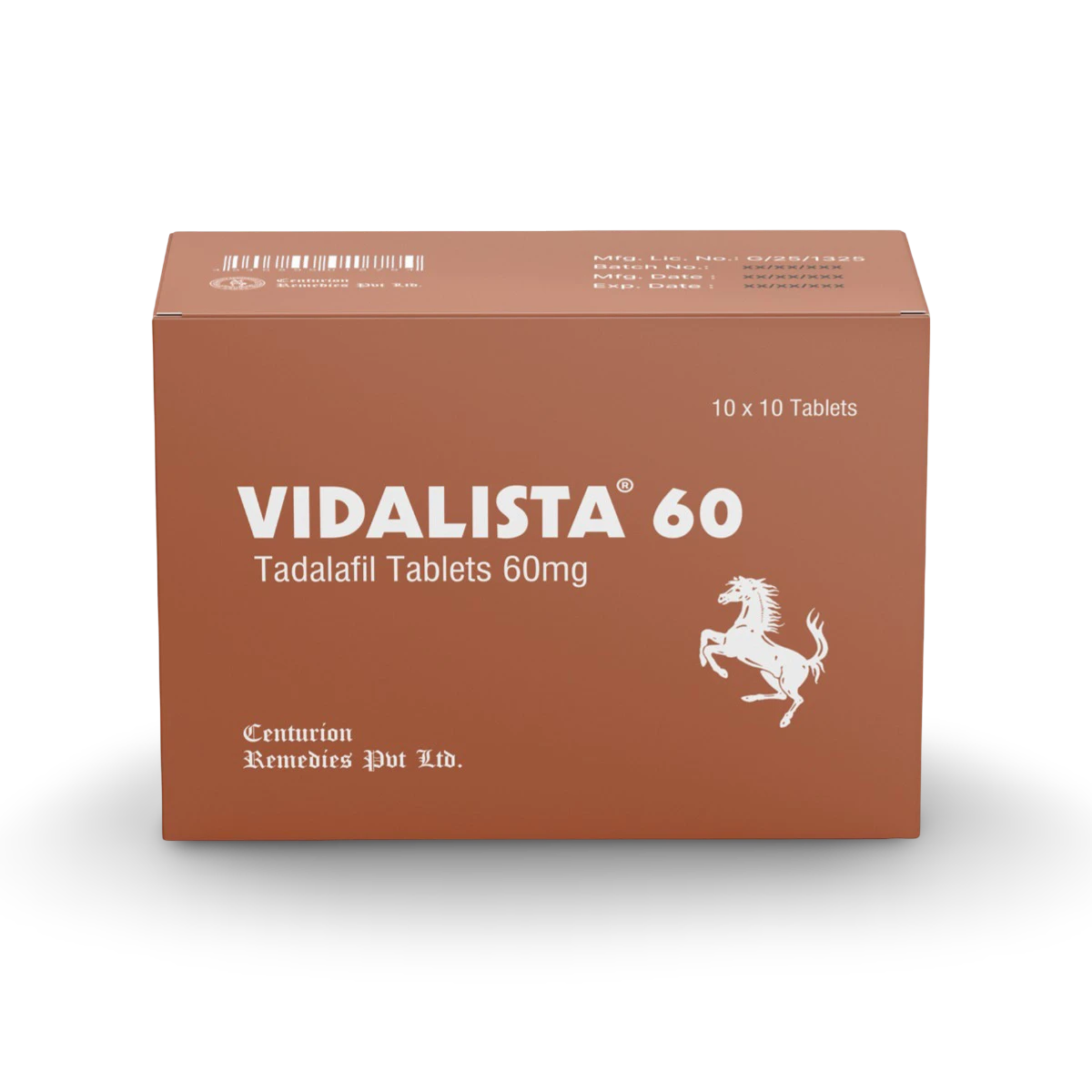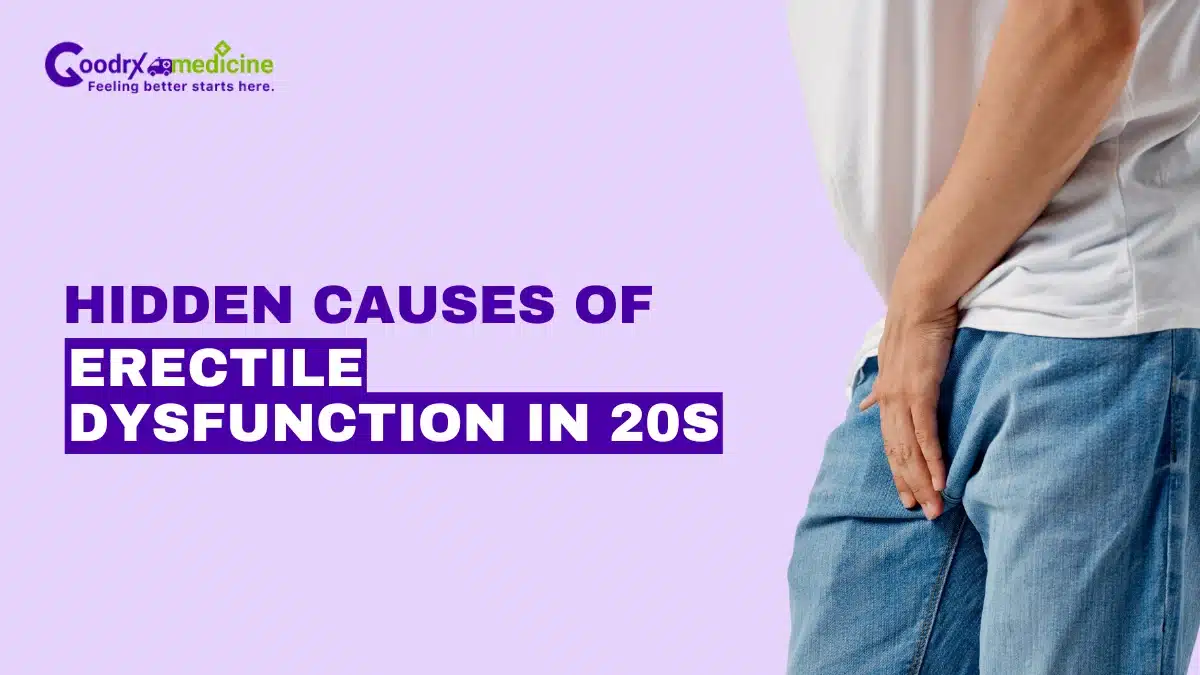Erectile Dysfunction (ED) or Impotence is generally assumed to affect exclusively older men. Yet, an increasing number of men or Assigned Males at Birth (AMABs) in their twenties are silently struggling with it. In a stage of life often marked by peak physical health, energy, and sexual drive, the inability to acquire or sustain an erection can be challenging, upsetting, and even embarrassing.
The fact is that ED in your twenties is more common than most people know, and it is rarely about just physical health. From rising stress levels and mental health struggles to poor lifestyle choices and hidden medical issues, there are many reasons why young men are facing this challenge.
Whether it’s psychological, physical, or both, treating ED early can lead to better outcomes, more confidence, and a more enjoyable sex life in the future. This article will highlight the most common causes of Erectile Dysfunction in 20s and ways to overcome the condition.
Common causes of Erectile Dysfunction in 20s
Several physical, psychological, and lifestyle factors could be the reason behind ED in men in their twenties. Let’s have a look at these causes of Erectile Dysfunction in young males.
Save up to 90% on your medicine bills

Cenforce 100 mg

Cenforce 200 mg

Kamagra Oral Jelly Rx 100 mg

Vidalista 60 mg
Physical causes of Erectile Dysfunction in young adults
Although occasional erection issues are common, persistent difficulties may indicate an underlying medical issue. These often include:
Vascular conditions
Vascular problems are the root cause of Erectile Dysfunction in young males, as sufficient blood flow is required to achieve and sustain an erection. Disorders, such as Atherosclerosis (artery constriction), High Blood Pressure, and High Cholesterol, can all hinder blood supply to the penis by damaging blood vessels or decreasing flexibility. When the arteries cannot deliver enough blood during arousal, it is difficult to obtain or maintain an erection.
Hormonal imbalances
While Testosterone levels normally decline with age, Low Testosterone in a young man can lead to reduced sex drive and, consequently, ED. Other endocrine (glands that produce hormones) abnormalities, such as thyroid problems, may also play a role.
Medications
Several prescription medications regularly used by young individuals might cause ED. These include antidepressants, hair loss medications such as Finasteride, and various blood pressure medicines.
Neurological conditions
Multiple Sclerosis (MS) or injuries in the spinal cord can impair the nerve impulses that pass from the brain to the penis and cause an erection.
Structural issues
Although less common, structural abnormalities with the penis, such as Peyronie’s disease, may lead to a curved or bent penis, affecting the ability to have erections.
Psychological causes of Erectile Dysfunction
Psychological factors are the major contributors to ED in males in their twenties. The following mental health issues could also be a reason behind ED in young men:
Performance Anxiety
This is one of the most common causes of Erectile Dysfunction in young males. Fear of being unable to perform sexually might restrict erections. A man who has had a single instance of ED may become so concerned about it happening again that the fear itself stops him from achieving an erection.
Stress
Prolonged stress from work, school, or personal life can have a negative influence on sexual function. When the body experiences stress, it generates hormones like Adrenaline. These hormones can restrict blood vessels, making it harder for blood to travel to the penis and induce an erection.
Relationship issues
Troubles in a relationship, such as poor communication, a lack of trust, or disagreements, can cause a mental block that stops a man from feeling sexually aroused, contributing to ED.
Low self-esteem and body image
Negative sentiments about one’s physique and a lack of self-confidence can cause Performance Anxiety, making it difficult to feel calm and involved during sexual activity.
Lifestyle causes of ED in 20s
Besides the above-mentioned physical and psychological causes, several lifestyle factors can also lead to ED in men in their twenties, including:
Smoking
Tobacco smoking damages blood vessels and lowers blood supply throughout the body, including the penis, affecting the ability to have an erection. As per an article published in the journal Andrologia in 2014, smoking is an independent cause of ED irrespective of age limit.
Alcohol and substance abuse
Excessive alcohol intake can impair the nervous system’s capacity to create an erection. Similarly, recreational substance usage has been linked to ED.
Obesity and lack of exercise
Being obese or overweight increases the likelihood of developing Diabetes and heart disease, both of which are important risk factors for ED. Sedentary lifestyles are also related to an increased risk of developing ED.
How to manage early age Impotence?
Managing ED in your twenties requires a thorough strategy that deals with both prevalent psychological and possibly physical reasons. The first and most crucial step is to consult a doctor, who might perform a diagnosis to determine the underlying cause.
For many young men, lifestyle changes are key. This mainly includes eating a nutritious diet, exercising regularly, quitting smoking, and limiting substance abuse, because these habits can significantly support vascular health and general well-being.
Psychological problems, such as Performance Anxiety, stress, or Depression, are frequently the root causes and can be efficiently handled by counseling or sex therapy.
When a physical reason is found, a doctor may suggest specific treatments. This can include oral medicines like Sildenafil and Tadalafil that boost blood supply to the penis, facilitating an erection. Other treatment choices, such as Vacuum Erection Devices (VEDs) and, less often, injections, penile implants or hormonal therapy.
Conclusion
Erectile Dysfunction (ED) in your twenties can be an unpleasant experience, but it is considerably more common than most people realize, and nearly always curable. Whether the common causes of Erectile Dysfunction in 20s are psychological, like Anxiety, medical conditions, or lifestyle problems, such as smoking, early detection is essential.
Young males shouldn’t ignore warning signals or be ashamed to seek help. Addressing mental health, changing daily behaviors, and visiting a healthcare expert can all make a big difference. Importantly, having ED in your twenties is frequently a symptom that something deeper needs to be addressed, either physically or emotionally.
Taking action now not only improves your sexual health but also boosts your general well-being and confidence.

Frequently Asked Questions
Does Vitamin D insufficiency affect erections in young men?
Yes. Low Vitamin D levels may block Nitric Oxide (NO) production and Testosterone synthesis, which are both required to produce strong erections. Deficiency can also increase Depression or Anxiety, thereby leading to ED in males in their 20s.
Can Sleep Apnea lead to ED in your twenties?
Yes, untreated Sleep Apnea reduces oxygen flow and Testosterone. Poor sleep quality also raises Cortisol levels, which impairs sexual function. While undetected Sleep Apnea is uncommon in young men, it can significantly worsen ED symptoms.
Can Antihistamines lead to ED in young males?
Yes, certain over-the-counter Antihistamines, such as Diphenhydramine, can interfere with Acetylcholine, a neurotransmitter involved in erections. While generally temporary, persistent or regular usage may impair sexual function in certain sensitive people.
Is delayed puberty a risk factor for ED in early adulthood?
Yes. Men who have delayed puberty may have long-term physiological abnormalities or psychological issues that impact their sexual confidence. If Testosterone levels remained low in adulthood, it could cause or worsen ED symptoms.
Can chronic dehydration lead to ED in young men?
Yes. Mild dehydration reduces blood volume and circulation, potentially impairing erectile function. It also raises Cortisol and fatigue, which impairs sexual performance. Staying hydrated supports cardiovascular and metabolic processes involved in sexual arousal.
When referencing outside resources, GoodrxMedicine always provides full citations. To learn more about the measures we use to maintain the quality of our content, please review our Content Information Policy.











